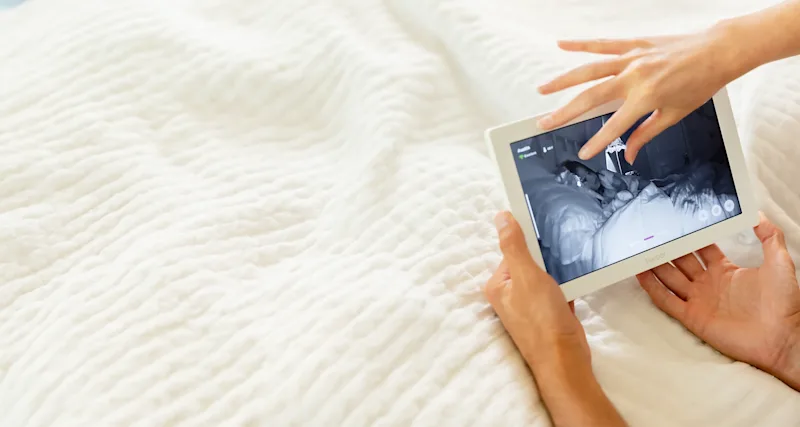I’ll never forget waking up in the middle of the night to feed my newborn daughter. It was around eight weeks in. My hormones had begun to settle, but my sleep and nutrition? They were practically non-existent. I was so focused on caring for her that I barely knew how to care for myself. Even the basics—brushing my teeth, changing my clothes, rinsing off—felt impossible some days. It was as though survival had taken precedence over self-care, and I couldn’t see a way to balance it all.
Looking back, I realize that sleep—both for me and my daughter—was the foundation I desperately needed to rebuild my well-being. Sleep deprivation impacts so much more than just your energy levels; it can affect your mood, your health, and your ability to fully enjoy those early moments with your baby. That’s why finding ways to get better rest as new parents is not just important—it’s essential. And I’d love to take this opportunity to help you prepare better than I did.
So, in this guide, we’ll explore practical strategies and tools, like a reliable baby monitor, sharing baby feeds and night wakings with your partner, and more, to help your whole family rest easier, starting tonight.
Why Sleep Matters for New Parents
From one mom to another—sleep is essential for physical and mental well-being. Without adequate rest, new parents can experience:
-
Increased stress levels: Sleep deprivation impacts your ability to handle daily challenges, which can intensify feelings of anxiety or frustration.
-
Weakened immune system: Lack of sleep makes your body more susceptible to illness.
-
Reduced cognitive function: Sleep is vital for concentration, decision-making, and memory—key skills every new parent needs.
Understanding the importance of sleep is the first step toward making it a priority, even in the chaotic days of new parenthood.
Prioritize Sleep Hygiene
Creating a healthy sleep environment and routine is one of the most effective ways to improve rest. Start by:
-
Establishing a bedtime routine: Even for sleepy parents, routines signal to the body that it’s time to wind down. I love to turn off our overhead lights and turn on our lamps and the salt lamp on my nightstand. And I try to rinse off and change my clothes from the day, which seems small but significantly impacts my overall mood.
-
Even if this bedtime routine doesn't mimic your baby’s, you can still work in your own sleep hygiene habits!
-
-
Optimizing your sleep environment: I love to keep our bedroom cool, dark, and quiet. We have blackout curtains, a white noise machine and I invested in some nicer bedding from Target—their Casaluna line is divine! This would be a great thing to put on your baby registry, too!
-
Limiting screen time: The blue light from phones and tablets suppresses melatonin production, a hormone essential for sleep. Try putting devices away at least an hour before bed.
"I learned the hard way that a calming sleep environment makes all the difference. We added blackout curtains, a white noise machine, and upgraded our bedding. It felt like a small luxury but helped me wind down after those long newborn nights," said Kelly Brown, RN, and Harbor's Director of Nursing.
Nap When the Baby Naps
Ya, ya, ya! While the phrase “sleep when the baby sleeps” is easier said than done, it remains one of the best ways to catch up on rest. Short power naps of 20-30 minutes during your baby’s daytime naps can help recharge your energy without making you feel groggy.
Some tips for successful napping:
-
Set the stage: Create a relaxing atmosphere with a cozy blanket and a comfortable spot to lie down.
-
Time it right: Avoid napping too late in the afternoon, as it could interfere with your ability to sleep at night.
But what about all the other tasks around the home that have been neglected? Ignore them. I promise you, they will get done. Better yet, this is the perfect task to give your partner.
Share Nighttime Duties
One of the most tangible ways to ensure both parents get adequate rest is by sharing nighttime responsibilities. Here are a few ways to divide tasks:
-
Alternate feedings: If you’re breastfeeding, consider pumping so your partner can take over some nighttime feeds.
-
Take shifts: One parent can handle the baby’s needs for a set block of hours while the other gets uninterrupted sleep.
"My husband and I found relief by taking shifts at night. I’d handle the early hours while he took the morning stretch," says Brown. "If you’re breastfeeding, try pumping a bottle for your partner to use—it can mean an extra hour or two of precious sleep!"
Use Technology to Your Advantage
Investing in reliable baby monitoring technology can be a game-changer for sleep-deprived parents. Harbor, a new baby monitor company, offers features designed to give parents peace of mind and better rest.
-
Crystal-clear monitoring: With up to 2K resolution and enhanced night vision, you can check on your baby without leaving your bed.
-
Local streaming for reliability: Unlike many monitors that depend on Wi-Fi, Harbor’s monitor can function offline, ensuring you’re always connected.
-
Lower infrared light emissions: Gentle on your baby’s eyes and promotes a better sleep environment.
Beyond its technical capabilities, Harbor’s monitor helps parents feel more secure, reducing the need for constant check-ins and allowing for deeper sleep.
"Checking on the baby without getting out of bed was a game changer," says Brown. "Harbor’s monitor, with crystal-clear video and ability to zoom in on baby, helped me relax, knowing I could peek in without hovering."
Create a Sleep-Friendly Schedule
Babies thrive on routine, and so do parents. Establishing a sleep schedule for your little one can eventually help the whole family get more rest. While it’s normal for newborns to wake frequently, you can start laying the groundwork for good sleep habits early on.
-
Track wake windows: Newborns can typically only stay awake for 45 minutes to 1 hour before needing sleep. Keeping track of these windows can prevent overtiredness, which often leads to difficulty falling asleep.
-
Develop a bedtime ritual: Simple activities like a bath, feeding, and lullabies signal to your baby that it’s time to wind down.
If you’re looking for an app to help you with your baby’s sleep schedule, I recommend using Moms on Call. It was my sleep bible for both of my daughters, and we’ve been fortunate to have two excellent sleepers thanks to their recommendations!
"Even in those blurry newborn days, we created a simple routine—warm bath, lullaby, and snuggles. It helped signal ‘wind-down time’ for both our baby and us," says Brown. "We weren’t perfect, but staying consistent made sleep a bit more predictable."
Seek Help and Build a Support Network
Raising a baby is a team effort. Leaning on your support network can provide much-needed rest:
-
Enlist friends and family: Don’t hesitate to ask for help with household chores or baby care so you can take a nap.
-
Utilize postpartum services: Meal delivery services, night doulas, or sleep consultants can ease the load during those early weeks.
Address Postpartum Sleep Challenges
For some parents, sleep issues go beyond typical exhaustion. Conditions like postpartum depression or anxiety can make it even harder to rest. If you’re struggling with persistent insomnia, excessive worry, or feelings of hopelessness, seek professional help. Therapy, medication, or support groups can provide relief.
Final Thoughts: Sleep Is Possible
The newborn phase is undeniably challenging, but with intentional strategies and the right tools, better sleep is within reach. Harbor’s baby monitor is an excellent investment for parents seeking peace of mind and improved rest. By prioritizing sleep hygiene, sharing responsibilities, and leaning on your support system, you can navigate these early days with more energy and resilience.
Remember, this phase is temporary. As your baby grows and sleep patterns stabilize, you’ll find a new rhythm that works for your family.
So, are you ready to improve your family's sleep? Check out Harbor's innovative baby monitor and explore more parent-approved sleep solutions in the Poppylist Shop.
Kelly Brown, Director of Nursing, is a Registered Nurse and proud mom of three with extensive experience in pediatrics. She is a seasoned Night Nanny with over 10 years of experience, specializing in sleep training and infant care. With her expertise, Kelly is here to support parents and families on their journey to better sleep and wellness.


